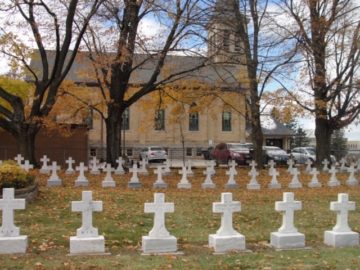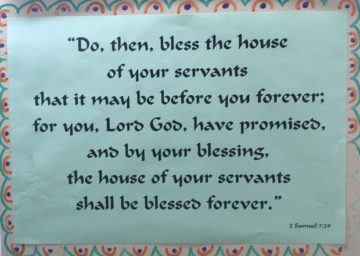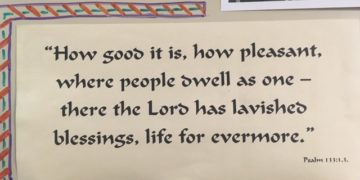As we continue to reflect on life after death, we offer a Franciscan Gospel reflection and questions written by Fr. Paul Gallagher, OFM for your prayer. They are edited by Franciscan Sister of Christian Charity Sister Anne Marie Lom and Joe Thiel. The excerpts from the Sunday readings are prepared by Joe Thiel. To read or download the complete pdf with excerpts for your prayer, please click here: Franciscan Gospel Reflection October 13 20019. Excerpts are from the Lectionary for Mass for Use in the Dioceses of the United States of America, second typical edition © 2001, 1998, 1997, 1986, 1970 Confraternity of Christian Doctrine, Inc., Washington, DC. Used with permission. All rights reserved. No portion of this text may be reproduced by any means without permission in writing from the copyright owner.
Luke 20:27-38 or Luke 20:27, 34-38
Some Sadducees, those who deny that there is a resurrection, came forward and put this question to Jesus, saying, “Teacher, Moses wrote for us, ‘if someone’s brother dies leaving a wife but no child, his brother must take the wife and raise up descendants for his brother.’ Now there were seven brothers; the first married a woman but died childless. Then the second and the third married her, and likewise all the seven died childless. Finally the woman also died. Now at the resurrection whose wife will that woman be? For all seven had been married to her.”
Jesus said to them, “The children of this age marry and remarry; but those who are deemed worthy to attain to the coming age and to the resurrection of the dead neither marry nor are given in marriage. They can no longer die, for they are like angels; and they are the children of God because they are the ones who will rise. That the dead will rise even Moses made known in the passage about the bush, when he called out ‘Lord’ the God of Abraham, the God of Isaac, and the God of Jacob; and he is not God of the dead, but of the living, for to him all are alive.”
Background:
In the gospel text for last week, Luke described Jesus’ encounter with Zacchaeus, a chief tax collector. That text concludes, “… for the Son of Man has come to seek out and save what was lost. (Luke 19:10)” Luke then relates Jesus’ telling of the parable of a nobleman who was going off to claim his kingship over the land. Before leaving he gave ten gold coins to his servants to use on his behalf while he was away. (Luke 19:11-27) Luke says that Jesus told this parable because he was near Jerusalem and people were thinking that the Kingdom of God would appear immediately. Following this parable, Luke tells of Jesus’ entry into Jerusalem. Once Jesus arrives in the holy city, he welcomes the crowds, weeps for the city, drives those engaged in trading from the temple, is questioned by the chief priests about his authority as a teacher, tells the story about tenant farmers, and finally is questioned about the emperor’s right to tax the Jews. Within these 46 verses are several key statements: After Jesus expels those engaged in trading in the temple, Luke tells his readers, “… The chief priests, the scribes, and the leaders of the people, meanwhile, were seeking to put him to death…” (Luke 19:47) Then relating Jesus’ parable of the tenant farmer, Luke concludes with “The scribes and chief priests sought to lay their hands on him at that very hour, but they feared the people…” (Luke 20:10) Thus Luke sets the stage for this Sunday’s text.
The Sadducees controlled the temple. They were a conservative group within the Hebrew tradition who relied only on the written Torah. They rejected oral tradition and any later writings that many other Jews, including the Pharisees, relied on for guidance for their lives. The Pharisees also believed in life after death, which was a new religious concept. Because the Sadducees did not believe in life after death, having children was an important way to extend one’s life beyond one’s death. Their understanding is reflected in Deuteronomy 25:5-10,
5 “When brothers live together and one of them dies without a son, the widow of the deceased shall not marry anyone outside the family; but her husband’s brother shall go to her and perform the duty of a brother-in-law by marrying her. 6 The first-born son she bears shall continue the line of the deceased brother that his name may not be blotted out from Israel. 7 If, however, a man does not care to marry his brother’s wife, she shall go up to the elders at the gate and declare, ‘My brother-in-law does not intend to perform his duty toward me and refuses to perpetuate his brother’s name in Israel.’ 8 Thereupon the elders of his city shall summon him and admonish him. If he persists in saying, ‘I am not willing to marry her,’ 9 his sister-in-law, in the presence of the elders, shall go up to him and strip his sandal from his foot and spit in his face, saying publicly, ‘This is how one should be treated who will not build up his brother’s family!’ 10 And his lineage shall be spoken of in Israel as ‘the family of the man stripped of his sandal.’
The issue of a brother marrying the wife of his brother was very real for people of the day. It was also linked to the deeper issue about how one’s life continues after death. Jesus’s response makes two points. The first is that life after death is not a continuation of one’s present life. It is life with God, eternal and without end. Therefore, there is no need to insure a continuation of one’s life through heirs. Jesus’ second point draws on examining their scriptures for insights that are not directly talked about in the text. He refers to the description of Moses’ encounter with God when he discovers that the bush, while on fire, is not being consumed. In the text, God says that He is the father of their ancestors, not that he was their father. Because He says He is, He is implying that His relationship is continuing and therefore they are alive.
Discussion Questions:
1. How did you celebrate Halloween, the Feast of all Saints, and All Souls? Does how you celebrate these days say anything to you about your attitudes, beliefs, or even feelings
2. around life after death?
3. Is it important for you that “something of you” goes on after you have died? In eternal life, do you think you will have a relationship with your own body? With people you loved? With creation?
4. Do you think that you will find any prostitutes, homeless, or even members of the Taliban among those who have found eternal life?
5. How do you think your relationships with people will differ in eternal life? Will those relationships be transformed into something totally new, healed, and made whole by the power of God, or will they continue as they have been while you were on earth?
6. When I think of life after death, I believe…
7. When I think of MY life after death, I hope…
8. Reflection on eternal life. I am most aware…
9. Can you take time to talk to God about the feeling that this gospel raises within you, your hopes and fear around eternal life, or the wisdom you find you need in order to trust in God’s love even beyond the barrier of death?





